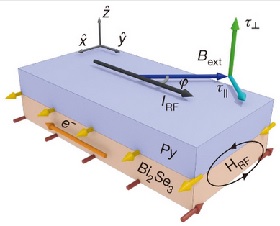Using AI to control energy for indoor agriculture
30 September 2024
Published online 7 August 2014

One type of data storage medium currently in use is made from at least two layers of a ferromagnetic material — a material that can be magnetized by an external field and will remain magnetized after the field has been removed — sandwiched together with other materials. The data is encoded in the direction of the ions in one of the ferromagnets, while the other one serves as a reference.
Now, an international team of material scientists has shown that it is possible to manipulate ions in the ferromagnetic layer more efficiently by sandwiching a single ferromagnetic layer together with a thin layer of an exotic material known as a “topological insulator”.
Electrons have an intrinsic property called “spin” which can be oriented in different directions. In topological insulators, the direction that an electron’s spin points is determined by the direction of the electron current along the surface. So, by applying a relatively small current to the topological-insulator layer, it is possible to manipulate the direction of the electron spins.
These spins, in turn, magnetize the ions in the adjacent ferromagnet, explains team member Aurélien Manchon, a material scientist at the King Abdullah University of Science and Technology (KAUST), in Thuwal, Saudi Arabia.
To test the concept, the team used a thin film of the topological insulator, bismuth selenide, sandwiched with a thin film of a ferromagnetic alloy of nickel and iron. The setup was about 10 times more efficient at magnetizing the ferromagnet than similar methods tried to date.
“In this bilayer system, the efficiency is humungous,” says Manchon. While it is too early to use this in applications because such systems are difficult to build, Manchon adds that “this first demonstration widens the horizon for the search of spin-based low power devices."
doi:10.1038/nmiddleeast.2014.198
Mellnik, A. R. et al. Spin-transfer torque generated by a topological insulator. Nature http://dx.doi.org/10.1038/nature13534 (2014).
Stay connected: